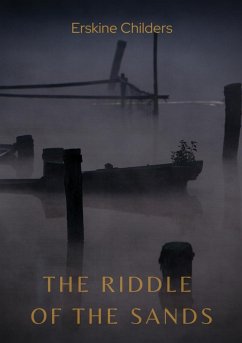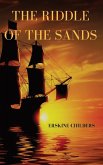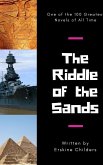The Riddle of the SandsThe Riddle of the Sands: A Record of Secret Service is a 1903 novel by Erskine Childers. The book, which enjoyed immense popularity in the years before World War I, is an early example of the espionage novel and was extremely influential in the genre of spy fiction. It has been made into feature-length films for both cinema and television.The novel "owes a lot to the wonderful adventure novels of writers like Rider Haggard, that were a staple of Victorian Britain". It was a spy novel that "established a formula that included a mass of verifiable detail, which gave authenticity to the story - the same ploy that would be used so well by John Buchan, Ian Fleming, John le Carré and many others.It was one of the early invasion novels, "... a story with a purpose" in the author's own words, written from "a patriot's natural sense of duty", which predicted war with Germany and called for British preparedness.Context The whole genre of "invasion novels" raised the public's awareness of the "potential threat" of Imperial Germany. Although the belief has grown that the book was responsible for the development of the naval base at Rosyth, the novel was published in May 1903, two months after the purchase of the land for the Rosyth naval base was announced in Parliament (5 March 1903) and some time after secret negotiations for the purchase had begun. Although Winston Churchill later credited the book as a major reason why the Admiralty had decided to establish the new naval bases, this seems unlikely. When war was declared he ordered the Director of Naval Intelligence to find Childers, whom he had met when the author was campaigning to represent a naval seat in Parliament, and employ him. At the time Childers was writing Riddle he was also contributing to a factual book published by The Times in which he warned of outdated British army tactics in the event of "conflicts of the future". He developed this theme in two further works he published in 1911: War and the Arme Blanche and German Influence on British Cavalry. analysis The novel contains many realistic details based on Childers's own sailing trips along the East Frisia coast and large parts of his logbook entries from an 1897 Baltic cruise "appear almost unedited in the book." The yacht Dulcibella in the novel is based upon Vixen, the boat Childers used for his exploration. In August 1910, inspired by the work, two British amateur yachtsmen, Captain Bernard Trench RM and Lieutenant Vivian Brandon RN, undertook a sailing holiday along the same section of the Frisian coast, during which they collected information about German naval installations. The two men were sentenced to four years custody by a military court in Leipzig, but they were pardoned by the Emperor in 1913. They joined "Room 40", the intelligence and decoding section of the British Admiralty, on the outbreak of war.the autor :Erskine Childers (1870-1922) was an Irish nationalist and novelist. He was the editor of the Cambridge Review and the author of the influential novel Riddle of the Sands, which the Observer listed as one of the "100 Greatest Novels of All Time." It is considered by many to be the first spy novel.
Hinweis: Dieser Artikel kann nur an eine deutsche Lieferadresse ausgeliefert werden.
Hinweis: Dieser Artikel kann nur an eine deutsche Lieferadresse ausgeliefert werden.








